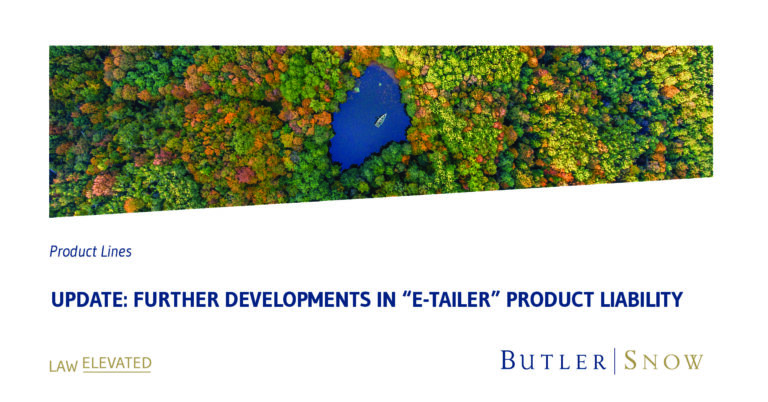In September, we addressed the developing caselaw governing an “e-tailer’s” exposure to products liability suits when a consumer purchases a defective product from a third-party vendor on the e-tailer’s sales platform. While these cases ultimately hinge on state law, courts have consistently focused on the level of control the e‑tailer exercised over the subject product, whether the state maintains an “innocent seller” or “sealed container” defense, and whether state law treats a downstream supplier’s liability as a function of public policy.
In the months following our original article, several courts have provided further guidance. In Stiner v. Amazon, for example, the Supreme Court of Ohio held that Amazon was not subject to product liability and negligence claims arising from a defective product that was stored, packaged, and shipped by a third-party vendor who listed it on Amazon’s “Marketplace.”[1] We addressed that opinion in an October update.
Another case worth watching is the Ninth Circuit’s unpublished, split decision in State Farm Fire & Cas. Co. v. Amazon.com, Inc., which it issued last month.[2] Applying Arizona law, the court held that Amazon was not subject to strict liability and negligence claims arising from a defective product that State Farm’s subrogor purchased from a third-party vendor on Amazon’s “Marketplace.” The court’s ruling centered on its conclusion that Amazon was not a “seller” under Arizona law.
Although Arizona courts generally apply the Second Restatement of Torts § 402A in product liability cases, the state has avoided the “technical limitations of the term seller or manufacturer as used in” § 402A.[3] Instead, Arizona courts apply a “contextual analysis and balance[] multiple factors to determine whether a company participated significantly in the stream of commerce.”[4] These factors include whether the entity: (1) provides a warranty for the product’s quality; (2) is responsible for the product during transit; (3) exercises enough control over the product to inspect or examine it; (4) takes title or ownership over the product; (5) derives an economic benefit from the transaction; (6) has the capacity to influence a product’s design and manufacture; or (7) fosters consumer reliance through their involvement.
After applying these factors and reviewing prior Arizona state court decisions, the panel concluded that Amazon wasn’t a “seller” under Arizona’s application of the Second Restatement. The court noted, inter alia, that Amazon expressly disclaimed any warranty from the product, never took title to the product, relied on its third-party sellers’ representations about product quality, and derived only a small benefit from each third-party transaction. The court also rejected State Farm’s argument that Amazon’s conduct in storing and shipping the product (through the “Fulfilled by Amazon” program) gave it sufficient control over the transaction to be considered a “seller.”
In his dissent, Judge Richard Clifton reasoned that the answer was not clearly covered by prior Arizona cases, which had never expressly addressed Amazon’s “responsibility” for third-party transactions.[5] Given “the transformation Amazon has wrought on the marketplace” and the lack of guiding state precedent, Judge Clifton concluded that the Supreme Court of Arizona should answer the questions presented in the case.[6]
Consistent with this reasoning, State Farm filed a petition for rehearing en banc on December 1st.[7] It argued that the panel’s decision was made without sufficient direction from Arizona courts, and raised significant policy concerns under Arizona law. It noted, for example, that Amazon effectively “conducts the sales transaction” by assuming control over the product, storing it in an Amazon warehouse, and shipping it to the customer, and that the panel’s opinion effectively deprives consumers of any recourse when Amazon chooses to conduct such transactions with overseas manufacturers who are not subject to jurisdiction in the United States.
State Farm’s petition for rehearing en banc remains pending as of the date of this article. The Ninth Circuit’s resulting decision will likely shed further light on the e-tailer product liability questions addressed in this series, particularly if it sends the matter to the Supreme Court of Arizona.
[1] Stiner v. Amazon.com, Inc., 2020-Ohio-4632, 2020 WL 5822477, *6 (October 1, 2020).
[2] State Farm Fire & Cas. Co. v. Amazon.com, Inc., No. 19-17149, 2020 WL 6746745 (9th Cir. Nov. 17, 2020)
[3] Id. at *1.
[4] Id.
[5] Id. at *3.
[6] Id.
[7] See State Farm Fire & Cas. Co. v. Amazon.com, Inc., No. 19-17149, doc. 32.
